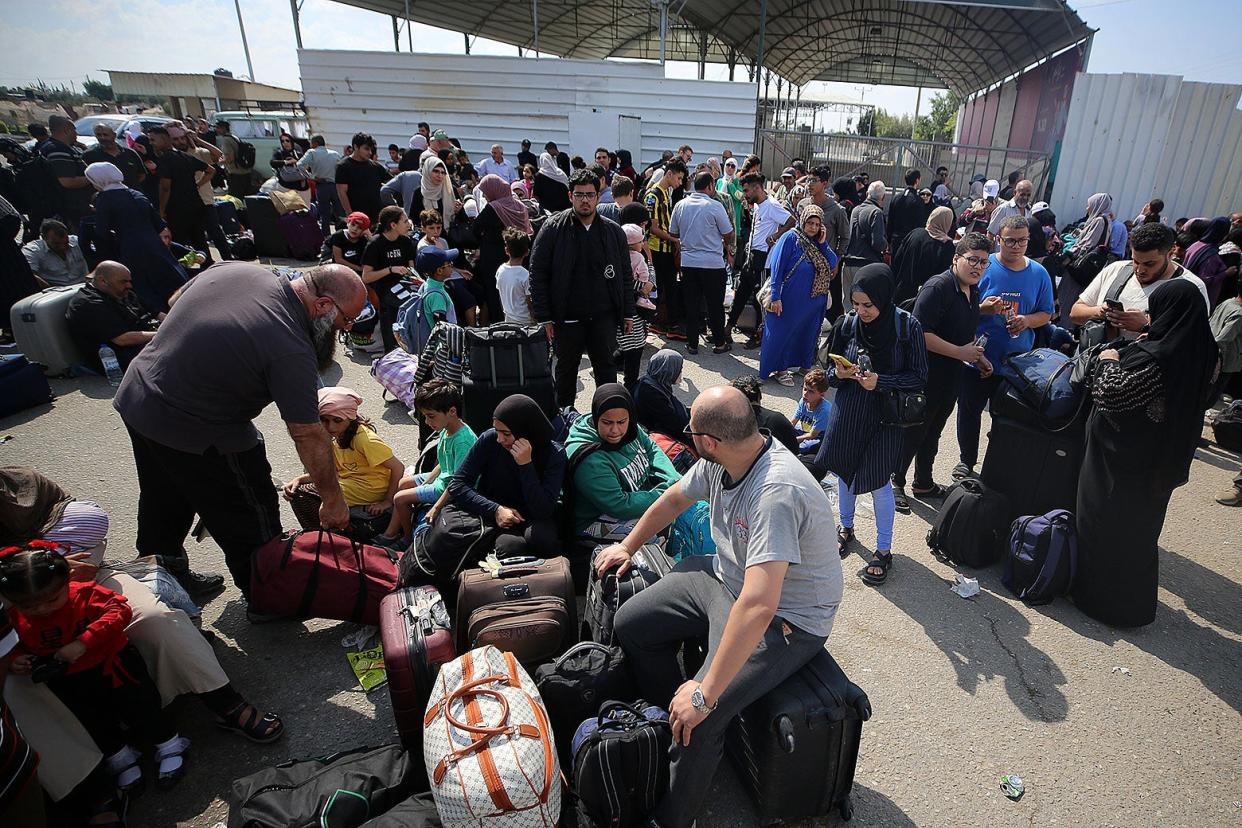As Conditions in Gaza Deteriorate, Why Is Egypt Keeping Its Border Closed?

- Oops!Something went wrong.Please try again later.
As Gaza runs out of fuel and water for the nearly 1 million Palestinians who have fled from north to south, Egypt—which could relieve much of the pressure by opening its border—has refused to do so.
Many have focused on Israel’s blockade of Gaza’s northern border since Hamas took control of the tiny strip of land in 2007—but Egypt has blockaded Gaza’s southern border since then as well.
The Biden administration seemed to have reached an agreement with Cairo, this past Sunday, to open the Rafah crossing on Egypt’s border, but as of Tuesday afternoon, it remains closed. As a further sign of the situation’s complexity, Hamas has praised Egypt for keeping the exit shut. The terrorist group wants to block Gazans from leaving so that Israel can be blamed for any further deaths and suffering.
Gaza used to be part of Egypt until the Six-Day War in 1967, when Egypt, Syria, and Jordan invaded Israel—and Israel beat them back, conquering and occupying the Sinai, East Jerusalem, the Golan Heights, and the Gaza Strip in the process. It remained in Gaza until 2005, when Prime Minister Ariel Sharon withdrew from the territory, deeming it more trouble than it was worth, evicting 8,000 Jewish settlers in the process. (Most of them resettled in the West Bank.)
The pullout did not resolve the tensions, which had been building for decades. In the late 1980s, radical militants in Gaza formed Hamas, which declared the destruction of Israel as its goal. Its leaders meant to counter the influence of both the Palestinian Authority (which was more interested in negotiating with Israel over territory) and Palestinian Islamic Jihad (which was a proxy to Iran).
Hamas was also the Palestinian chapter of the Muslim Brotherhood, a radical organization in Egypt, which President Hosni Mubarak considered a danger to his rule—and so he viewed Hamas as a danger as well.
The danger didn’t pose a huge threat until 2006, when Hamas won the Palestinian National Authority’s legislative election in Gaza. After taking control, Hamas kicked out the Palestinian Authority, which was, and still is, in charge of the West Bank. (There have been no elections in Gaza since.) In response to Hamas’ growing militancy and power, Israel and Egypt soon tightened their borders and imposed a permanent blockade. Egypt lifted the blockade in 2012, when Mubarak was overthrown and replaced by Mohamed Morsi, who was affiliated with the Brotherhood. Morsi’s reign lasted just over a year; he was succeeded by Sisi, who reimposed the restrictions.
Even under Mubarak and Sisi, Egypt has relaxed the blockade now and then to allow certain supplies to come in and certain refugees to go out. Cairo’s leaders have also refrained from clamping down on Hamas too harshly, lest they alienate Palestinians on the home front. (Rulers of neighboring countries, such as Saudi Arabia and Jordan, who also detest Hamas, have had to walk a similar tightrope.) Over the years, Egypt—which has observed a peace treaty with Israel since it was signed by Anwar Sadat and Menachem Begin in 1979—has served as a mediator between Hamas and Israel, arranging cease-fires and prisoner exchanges.
Now Israel stands poised to invade Gaza, Hezbollah has been lobbing rockets into Israel from the north, Iran is mulling whether to enter the war or stay out, the United States has deployed two aircraft carriers and a rapid-response force of 2,000 Marines to deter Hezbollah and Iran from intervening (and to retaliate if they do), and a humanitarian crisis is taking hold in southern Gaza, where many civilians fled after Israel warned them avoid the coming pounding of northern Gaza, where Hamas has its bases. As these tensions mount and as prospects of a wider war loom, Sisi is facing the same conflicting pressures that Egypt has faced for the past 16 years.
Sisi also faces enormous economic pressures, aggravated by the 70,000 refugees that Egypt is hosting from the war in neighboring Sudan, with another 300,000 begging for shelter as well. And so Sisi is leery of taking in more refugees from Gaza. He also fears that a flood of Gazan refugees might include Hamas terrorists, who could stir up trouble in Egypt—and that if Israel does invade and re-occupy Gaza, the refugees might not be let back in, thus leaving Cairo responsible for their long-term well-being.
President Biden will be visiting Israel on Wednesday, mainly as a show of solidarity with Jerusalem’s wartime unity government. But some suspect that he will have some announcements to make—deals that Secretary of State Antony Blinken has all but wrapped up in his crisscrossing shuttle diplomacy through the region. The hope is that one of them concerns help for the nearly 1 million displaced Palestinians in southern Gaza.
Meanwhile, at least according to some reports, Biden has persuaded the Israeli government to delay its invasion until after the border with Egypt is opened. This has left time for other diplomatic options and overtures to play out, one way or the other, before Israel’s biggest war in 60 years engulfs the country and possibly the region.

